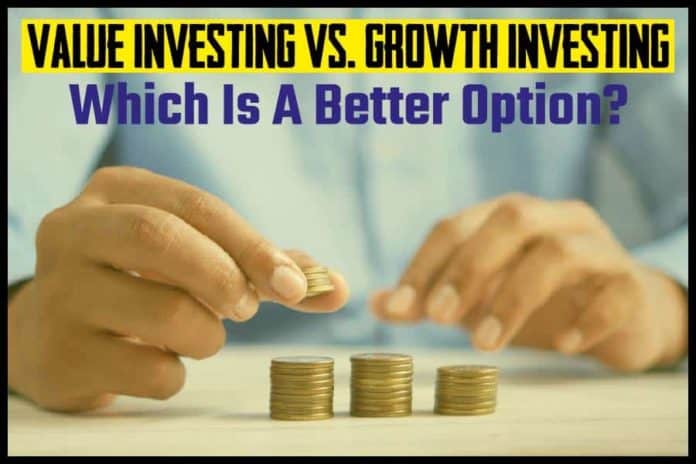Do you need expert investment advice to grow your hard-earned money? If you’re looking for a great investment strategy, both value investing and growth investing can be great options.
In a value stock, investors find opportunities to buy shares at low prices and focus on the future growth of the stocks. On the other hand, growth companies offer rapidly increasing stocks at higher prices. So before buying growth or value stocks, it’s crucial to know their differences and choose one that is better for you.
Growth And Value Stocks: The Differences
Of course, every investor wants a good amount of profit. But ensuring that you earn the profit you want will require strategies and efforts. So, you need to be wise about what you invest in. To help you decide, check out the differences between the two investing styles:
Growth Stocks
Growth stocks tend to give an ideal amount of income to growth investors. When you purchase a growth stock, its growth rate will be higher than other types of stocks. Meaning, you’ll have a high chance of receiving significant opportunities to boost the company’s reputation and generate a lot of sales. In addition, your earnings will most likely be higher than most of the competitors. However, the market value of this kind of stock is expensive because a growth investor is expected to have a high price-to-earnings ratio.
Value Stocks
Not everyone appreciates how wide the scope of deep value investing can be and how it can generate good profit. Most people see the value of stocks based on their price in the market. But value investors see the real value of the stock without basing it on its market price. They don’t focus on the current growth of a company. Instead, they trade for cheap valuations and strategies for the long-term growth of their stocks.
Which Is Better For You?
Both growth and value stocks can give you incredible opportunities. Yet, they also both come with risks. So, it’s important to analyze what is really applicable to you and invest based on your preferences. You can use the guidelines below.
Growth Investing
Growth investing comes with advantages and disadvantages that you will experience once you purchase this type of stock. It is suitable for you if you prefer the following:
You’re not planning to use the funds from your shares immediately.
Growth companies are less likely to give shares to stockholders immediately. They focus on reinvesting their available cash in their businesses to make them grow further. So, it’s important that you have enough time to wait and allow it to grow.
You’re prepared for big changes in the stock price.
Growth stock prices are sensitive to changes. When there are many opportunities, the business can significantly grow. On the other hand, when the business meets certain issues, the sales could also drop significantly.
You know you can find a winning company from lots of competing businesses.
There are various growth companies to choose from, and it won’t be easy to tell which one will give you the best profit. So you need to be confident that you can analyze the sales history of companies and other crucial factors.
Value Investing
Value investing also has pros and cons, which are crucial to consider before buying this type of stock. It will be great for you if you like the following:
You’re interested in the current income of the business.
Unlike growth investing, value investing will allow you to get a portion of the current income to shareholders. Since most people do not see the potential of value stocks, value companies still have to make their stocks attractive.
You want a stable stock price.
If you want a stable stock price that is not sensitive to changes, value investing will be ideal for you. As long as the condition of the company is in the ideal range, the stock price will remain good.
You’re confident that you can see the real value of value stocks.
Sometimes, stocks are cheap because their value is not really that high. The company might have completely fallen and lost its innovativeness which is crucial to advance against its competitors. For this reason, you have to ensure you can determine which stock really has a good value. Do your research and be careful of value stock traps.
Investing Vs. Trading
Are you primarily an investor? Or perhaps you’ve also tried trading? Investing and trading may look the same. However, they have differences in performance, market timing, and profits. The risk profiles and profit expectations also differ between investing and trading.
Investors can take advantage of trading’s short-term changes in stock prices to provide high returns. On the other hand, investing is a long-term activity, considering the stock price and the company’s growth. While traders focus on the stock’s past and present performance, investors look forward to the profits the stock promises to generate in the future. Learn the difference between trading and investing here.
Whether you prefer to engage in value or growth investing, it’s crucial to have a solid financial plan and portfolio. The same is true with traders. Having a diverse investment portfolio is better than focusing on stocks alone. For instance, you might also want to invest in foreign exchange, cryptocurrency, or precious metals, such as a gold individual retirement account (IRA).
It’s likewise essential for traders and investors to keep abreast of market updates as this enables them to act promptly. You should also stay informed about updated stock news and trends. If you find these too technical, you may consult a financial or wealth advisor to help you determine the best investments for you.
Conclusion
Having great financial plans, such as investing your money, is wise. Instead of keeping your funds in banks or safety deposits, you allow them to grow and improve your financial life. However, investments come with risks, including both growth and value investments. It’s good to have a large amount of profit, but it’s also risky because if your strategies fail, you can lose a great amount of money. Therefore, consider the differences between growth and value investing, along with their risks, before you buy stocks.




